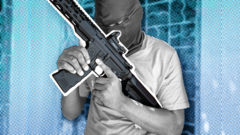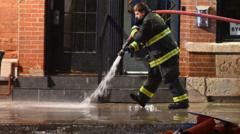A recent investigation reveals how unchecked gun sales from the US contribute to escalating violence and instability in Haiti, where gangs have taken control.
**US Arms Fueling Chaos in Haiti: A Detailed Investigation**

**US Arms Fueling Chaos in Haiti: A Detailed Investigation**
An in-depth look at the trafficking of firearms from the US to gang-dominated Haiti.
The recent influx of firearms from the United States to Haiti has sparked concern as the Caribbean nation grapples with escalating violence and gang dominance. An investigation conducted by BBC World Service and BBC Verify has shed light on the alarming flow of guns, highlighting a convoluted network of lax regulations and corruption that enables traffickers to bypass a UN embargo.
This investigation centers on the seizure of two cardboard boxes that contained 12 assault rifles, 14 pistols, and nearly 1,000 rounds of ammunition. Announced by Haitian police in April 2024, these weapons originated from Fort Lauderdale, Florida, and were stashed among food and clothing on a cargo ship bound for Cap-Haitien, Haiti.
Experts have described the United States as a "supermarket" for weapons fueling an arms race among Haitian gangs. This particular shipment, transported by the Rainer D cargo ship, is linked to two Haitian brothers based in the US who allegedly employed "straw buyers" to acquire the arms, circumventing background checks that are required in many states.
Alliance International Shipping, the company responsible for the shipment, claimed it operates by leasing storage for clients without directly managing the cargo. However, an expert noted that the majority of containers headed to Haiti from South Florida go uninspected by US Customs and Border Protection, highlighting the gaps in regulations that allow such operations to continue.
Upon arriving in Haiti, police discovered the weapons during a targeted search, leading to the arrest of a senior customs official involved in the smuggling operation. The customs broker named as the consignee for the shipment is currently evading authorities amid rising gang violence that has claimed thousands of lives and displaced approximately one-tenth of Haiti's population in 2024 alone.
Local citizens like Wilson, a handyman who was injured while fleeing gang clashes, illustrate the dire situation on the ground. Many Haitians now live in makeshift shelters as gangs exert control over increasing portions of the capital, Port-au-Prince. With the gangs reportedly holding sway over 85% of the city, experts have concluded that the influx of weapons continues to intensify the chaos and instability across Haiti.
Despite the grim reality, the investigation revealed that the trafficking of guns remains pervasive, with records indicating at least 286 shipments tied to individuals associated with gangs being processed before sanctions were imposed on them. Calls for stricter US gun control measures have been echoed by experts, who argue for better tracking of firearm sales to prevent these dangerous exports.
As authorities and international organizations grapple with the crisis, the urgent need for reform and significant action to combat arms trafficking from the United States to Haiti has never been clearer. The conversation around these issues is intensifying, with experts urging greater accountability in firearms sales and more comprehensive laws to stem the flow of weaponry to violent gangs in Haiti.




















